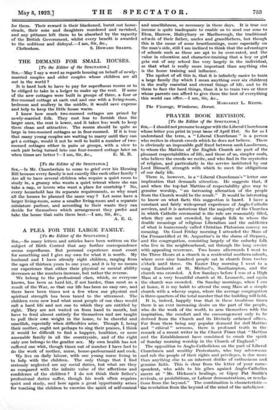A PLEA FOR THE LARGE FAMILY.
[To the Editor of the SPECTATOR.] Sin,—So many letters and articles have been written on the subject of Birth Control that any further correspondence seems superfluous. But personal experience must count for something and I give my own for what it is worth. My husband and I have already eight children, ranging from the ages of thirteen years to one year, and it is by no means our experience that either their physical or mental ability decreases HS the numbers increase, but rather the reverse.
We belong to the professional class, which, as everyone knows, has been as hard hit, if not harder, than most as a result of the War, so that our life has been no easy one, and there have been times not a few when our physical and spiritual strength has been taxed to the uttermost. The children even now lead what most people of our class would call a hard life" and not one to which they are entitled by right. They are not waited on from hand to mouth, but have to fend almost entirely for themselves and are taught to pull their own weight in the home, to be cheerful and unselfish, especially when difficulties arise. Though I, being their mother, ought not perhaps to sing their praises, I think it would be difficult to find a happier, healthier, or more amenable family in all the countryside, and of the eight only one belongs to the gentler sex. My own health has not suffered one whit, though times out of number I have had to do the work of mother, nurse, house-parlourmaid and cook.
We live on daily labour, with one young nurse living in to help with the children. The only things that I find seriously neglected are my social duties, but what are they
as compared with the infinite value of the affections and confidence of the children ? I do not think their father's professional duties suffer; though his Work often requires quiet and study, and here again a great 'opportunity arises for teaching the children to exercise the spirit of self-control and unselfishness, so necessary in these days. It is true our income is quite inadequate to enable us to send our sons to Eton, Harrow, Haileybury or Marlborough, the traditional schools of their father, uncles and grandfathers, but though this is the cause of some heartburnin,gs, more especially on the man's side, still I am inclined to think that the advantages of schools such as these are apt to be over-rated, and the value in education and character-training that a boy or girl gets out of any school lies very largely in the individual, so that what is really more important than anything else is the home training and influence.
The upshot of all this is, that it is infinitely, easier to train a large family (by which I mean anything over six children) in the really essential and eternal things of life, and to fit them to face the hard things, than it is to train two or three whose parents can afford to give them the best of everything this world can offer.—! am, Sir, &c.,














































 Previous page
Previous page